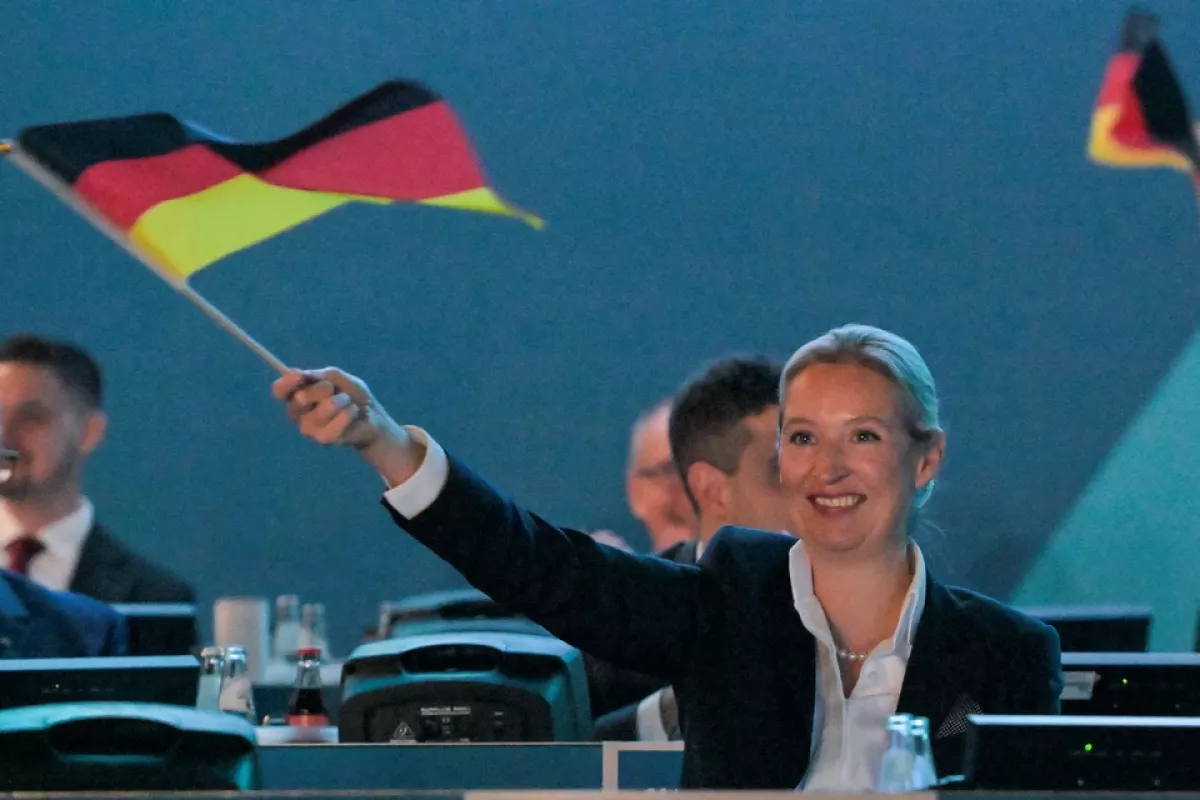Pre-election debates in Germany and ideological manipulations The AfD is rushing to power
Recently, there was a conversation between billionaire Elon Musk and the leader of the far-right party Alternative for Germany (AfD) Alice Weidel. Elections are coming soon in Germany, and Musk is supporting this organization, which is why he provided his X platform (formerly Twitter) for her speech. The speech gained widespread attention due to one remark made by Weidel, a candidate for Chancellor of Germany. She stated that Adolf Hitler was a “communist, socialist guy."
Notably, her own party is often accused of links to Nazi ideology, as it strongly opposes migrants, makes xenophobic statements about various minorities, and criticizes LGBT rights. Finally, her party takes conservative positions, advocating for strict family values. Adolf Hitler's party, the National Socialist German Workers' Party (NSDAP), held similar views in this regard.

Such accusations against the AfD are most often made by the left. Therefore, it was important for Weidel to deflect attention from her own party by shifting the blame onto her left-wing opponents, the Social Democrats and Marxist-Leninists (supporters of the ideas of Lenin, Stalin, Trotsky, Mao, etc.), by claiming that Hitler was their ideological ally.
The regime of the Third Reich is considered an absolute evil in the modern world. That is why supporters of various ideological movements are keen to distance themselves as much as possible from it, rejecting any resemblance to Nazism and accusing their opponents of links to Nazism.
Weidel pointed out that the Nazi leader himself had emphasized the socialist nature of his party and actively pursued a policy of nationalization, which is characteristic of left-wing movements. In her view, this meant that the state was seizing private enterprises and becoming their owner.
Weidel added that the AfD espouses exactly the opposite values: conservatism and libertarianism, i.e., a pure market economy free from government regulation. The representative of the German far-right sought to deflect suspicions of Hitlerism and shift the focus onto her left-wing opponents. This was her main objective.
The left is often used to describe those who advocate for strengthening the role of the state in the economy and protecting minorities. In recent times, the left has often relied on these issues during elections.
The question is not as simple as some might think. Searching for an answer sheds light on the nature of European politics as a whole over the past few centuries.
The truth is that Hitler did indeed uphold family values, although, in his view, these were secondary to serving the state, the Third Reich. He despised various minorities. It is unlikely that he can be considered left-wing in economic terms if one considers the nationalization policy—state control over industry, trade, and banks—to be left-wing.

Alex Yusupov, a member of the German Social Democratic Party and an analyst at the Ebert Foundation, poses a reasonable question: "So what exactly did the Third Reich nationalize? It created state-owned corporations (Reichswerke Hermann Göring, Volkswagen), had a regulator for defence production and resource management (Reichsamt für Wirtschaftsausbau), pushed through price and cartel policies, but Thyssen, Krupp, IG Farben, Flick, Daimler-Benz, Siemens, Allianz, BMW, Bosch all remained privately owned, and the superprofits from government contracts went into private pockets."
In the 1930s, the NSDAP was possibly the only ruling party in Europe that conducted a large-scale privatization campaign. The Third Reich transferred "German Railways," the largest state-owned company in the world in its sector, into private hands. Subsequently, enormous mining companies, shipyards, and steel mills were privatized. Between 1936 and 1937, the government privatized several major banks, including Deutsche Bank.
The Nazi regime handed key industries to businesspeople close to it, linked to the NSDAP. There was a merging of private capital and the party elite. At the same time, the Reich’s policies led to the concentration of capital in the hands of a tiny group of people connected to the ruling power. During World War II, from 1939 to 1945, this group would secretly control the entire German economy, aligning their actions with the military machine—not only to line their pockets with government contracts and seize and colonize Europe, extracting maximum wealth from it, but also to avoid defeat in the war.
It is important to add that the leadership of the Reich implemented extensive social support programs for the German working and rural populations. These social groups were literally showered with benefits. The government ensured full employment through military contracts, pursued policies aimed at improving conditions in the workplace, created children's and sports camps, and arranged affordable tourist excursions for German workers. Farmers were granted debt forgiveness, low-interest loans for agricultural development, and high purchase prices for their produce, set by the state. The Reich's domestic policies were characterized by support for the welfare state, closely resembling social democratic approaches.
Alice Weidel conveniently omits this aspect. The Reich's social policies were popular and were key to ensuring the loyalty of the German population to the dictatorship. Weidel offers nothing similar. Her ideal—a pure market economy with no state intervention—does not include support for the social underclass or the working class.

It is important to remember that the extensive social policies undermined the Reich's finances, forcing it to resort to further attempts at external aggression in order to secure prosperity through plunder and killings in neighbouring countries. According to German historian Götz Aly, the Reich spent too much, including on social policies, and was constantly on the brink of financial collapse. This pushed it toward further expansion.
In essence, this is also a very characteristic example of European policy—specifically colonial policy. Various states, such as Great Britain and France, sought to improve their finances through colonial conquests and had been doing so for centuries. Colonial expansion was a part of the policy of European capitalist countries for centuries, contributing to the enrichment of their ruling elites.
The idea that Hitler was a leftist who dreamed of building something resembling the Soviet Union (a country where the state apparatus, having become the owner of factories, farms, and land, took over the entire economy and exploited the workforce as its new master) is unfounded. It is as absurd as, for example, attempts to claim that he wanted to build something like the Paris Commune of 1871 (created by a working-class uprising), where property would not be state-owned as in the USSR, but rather communal, in the hands of self-managing labour collectives and the city council of delegates—essentially a communal, socialist, classless, and stateless society.
Of course, Adolf Hitler did nothing of the sort. He was never an enemy of business. He dreamed of private entrepreneurs seeing themselves as elements of the regime, loyal to its leader. In practice, the Third Reich was a state behind whose external facade hid an alliance of the largest private companies, oligarchs, military officials, and bureaucrats. They profited from privatizations and government contracts, viewing war and colonization as ways to enrich themselves, and later as a means of survival amidst successive defeats on the front. Perhaps they saw themselves as tools of the state, but no less, the state was their tool. It is impossible to separate one from the other here. Many European states today are nothing more than examples of public-private partnerships, where large businesses and the bureaucracy merge into one "great lump," aiming for enrichment by exploiting hired labour and global expansion—seizing new markets and resources.
This obvious secret of the Reich is hidden or carefully avoided by nearly all major European parties, both right-wing and left-wing. It is uncomfortable for them to acknowledge the fact that the uniqueness of the Reich has been greatly exaggerated. It was a fairly typical large, ambitious European state, just one that was extremely brutal and sought to accelerate the processes of colonization by rapidly seizing new territories. Everything else—the harsh policies toward minorities, conservatism, and so on—are just the cherries on this foul-smelling cake.








